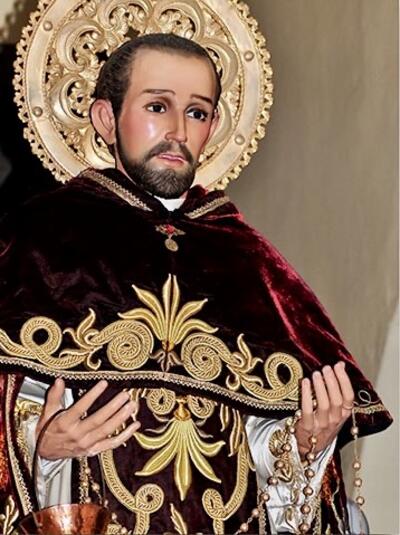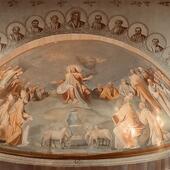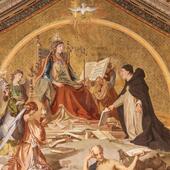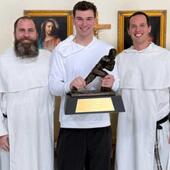St Juan Macias: Shepherd and Porter
St. Juan Macías was born in 1585 in a small town in Spain. Orphaned at a young age, he and his sister were raised by their uncle. As a boy and young man, Juan worked as a shepherd and became known for praying while he tended the flocks.
In his thirties, after an arduous journey through the West Indies, Colombia, and the Andes, he finally reached Lima, Peru, where he would become friends with the future St. Martin de Porres. He spent two more years herding before requesting entrance into the Dominicans at the Priory of Mary Magdalene as a lay brother. Eventually, he was appointed assistant to the porter of the priory.
For the rest of his life, Juan was marked by this role as porter. As a lay brother he showed deep love for the poor, devotion to the Rosary, and faithfulness in prayer and penance. His holiness was so remarkable that stories tell of miracles, visions of St. John the Apostle, and even of a donkey who served as his unlikely companion in fundraising.
In essence, the two defining seasons of St. Juan Macías’ life were his years as a shepherd and his years as a porter—both bearing immense spiritual fruit.
Juan Macías the Shepherd
Between his childhood and early adulthood, and later during his two years in the New World, Juan spent more time shepherding than most. Along with Pope St. Pius V, he is among the canonized Dominicans who knew the shepherd’s life well. Juan understood Christ’s words: “I am the good shepherd. A good shepherd lays down his life for the sheep.”
From his youth he cherished the Rosary. His years with the flocks not only deepened his understanding of Christ the Good Shepherd but also gave him countless hours for prayer and contemplation. These years prepared him for his later ministry as porter, where he handed on the fruits of his contemplation to those he served.
Juan moved from tending sheep and meditating on the Gospel to feeding the hungry, visiting the sick, and serving Christ in those who came to the priory gates—all while keeping a rigorous life of prayer and penance.
Juan Macías the Porter
As assistant to the porter, Juan joined a ministry deeply rooted in Christian tradition: welcoming guests as Christ himself. As the Rule of St. Benedict says, “All guests who present themselves are to be welcomed as Christ, for he himself will say: I was a stranger and you welcomed me." (Matt 25:35)
For his canonization in 1975, Br. Vincent de Couesnogle, then Master of the Dominican Order, wrote:
Juan Macías is not only a messenger of social reform; in the first place, he is a theologian. The Church, in placing before our eyes the good works done by Juan Macías, illuminates the name and will of God with a brighter light and invites all Christians to glorify their Father who is in heaven.
Some might claim that Juan Macías neither preached nor wrote. He was never ordained, and he left no recorded sermons. Yet he embodied a truth expressed by the early monk Evagrius of Pontus: “If you are a theologian, you truly pray. If you truly pray, you are a theologian.” Today we often use “theologian” to mean someone formally trained in theology. But the truest theology flows from love. By that measure, Juan’s life was a sermon of love.
St. Juan Macías gives us a beautiful example of following Christ: the Good Shepherd who lays down his life for the sheep and the Gate through which we enter heaven. Juan answered Christ’s call by laying down his life for others. His years as a shepherd formed him for his ministry as porter, where he became a beloved servant of the poor and sick while deepening his union with God in prayer.
St. Juan Macías, shepherd and porter, pray for us!
Hope Zelmer
Hope Zelmer is a writer and a former theology teacher and campus minister at Fenwick High School, a Dominican Catholic preparatory school in Oak Park, Illinois. Hope has written for publications such as FaithND, Church Life Journal, and Fem Catholic. She holds a BA and MA in theology from the University of Notre Dame.





